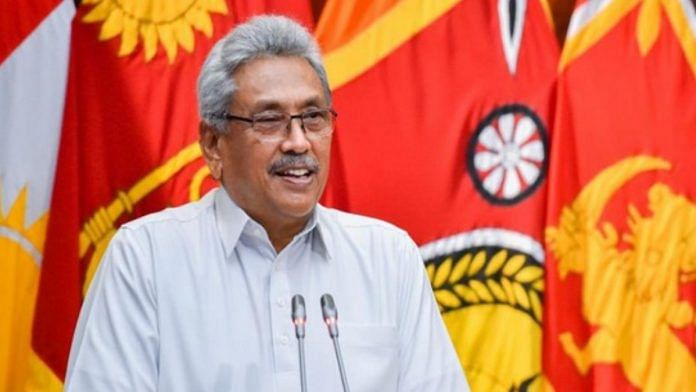In the end Sri Lankan President Gotabaya Rajapaksa did flee his country in an Air Force aircraft, but thankfully not in an Indian Air Force flight as BJP leader Subramanian Swamy would have liked.
As Commander-in-Chief of the Sri Lankan armed forces, he continued to remain in control and place constitutional orders, which he did to make Sri Lankan Air Force fly him out to the Maldives. Ironical destination since the Maldives has had its share of popular upsurges and regime change in the last two decades. South Asia’s two island nations have seen popular movements for change in the face of economic hardships.
Subramanian Swamy’s interventionist appeal went against the grain of Sri Lankans’ wishes, India’s interests and most importantly, the ethos of military functioning. India’s military cannot be used to protect the interests of an individual or their family—Indian or foreign—in any crisis. The military’s primary role is to protect India, its people or any other nation that requires such help. It is another matter that India has not accepted such a responsibility as and when it has come its way since it was signed by the intervention in Sri Lanka in 1987.
Also Read: Maldives National Party expresses ‘unhappiness’ over govt’s decision to allow Rajapaksa’s visit
National interests come first
India’s successful 1988 intervention in the Maldives, Operation Cactus, by Agra-based 50 (Independent) Parachute Brigade and the 6th battalion of the Parachute regiment has unfortunately long been forgotten, or relegated from its important status as a policy performance lesson. India should have been actively involved in the Maldives once again in 2012, in Iraq when the Islamic State (ISIS) kidnapped 40 workers from Punjab near Mosul in 2014, and in 2018 when the Maldives had a constitutional crisis all over again.
Timidity only begets disdain in policy circles, as China walked over Indian interests in neighbouring island nations, and ISIS brutally massacred the labourers from Punjab.
The deployment of Indian military assets in aid to foreign policy initiatives is not a question of morality, neutrality or hesitation. Neither of these sensibilities help national interests in the long run, even if they may give a temporary feeling of ease, if at all. India’s military assets are raised, trained and prepared to operate in most environments so as to promote the country’s interests, whether within the country or overseas. There should be no squeamishness about such deployments, despite the unfortunate aspect of military life that not all operations are sanitised and safe. Accidents can happen, and some won’t come back.
Stand with people, not personalities
In the case of sending aid to President Rajapaksa, there was no national interest in entertaining such a request. India’s concerns lie with the people of Sri Lanka, of every denomination in equal measure. And when the Rajapaksa family had been publicly ridiculed for so long, it would have been truly comic on India’s part to accept such responsibility. Comic only because despite their hardships over the months, the Sri Lankan people have obviously not lost their sense of humour, and the Rajapaksa family is now being publicly shamed by some clever name calling. For instance, Mahinda Rajapaksa, the former prime minister (and once president too) as ‘mynah’ and Basil Rajapaksa, finance minister and former president Don Alwin Rajapaksa’s son, as ‘Kaputu’, or crow.
With such public sentiments in tow, it would indeed have been a debacle had India intervened to protect a family well past its value date with the people of Sri Lanka. Not that India has not protected a Sri Lankan president before. After the signing of the Indo-Sri Lanka Accord on 29 July 1987, former president Junius Richard Jayewardene had Indian special forces protecting him for a few months until the threat that emanated from a resurgent Janatha Vimukthi Peramuna (JVP) was neutralised. The JVP was then running riot in the southern parts of the island nation. Massacres during that period were as gory and ghastly as they come.
There was even a possibility of rogue elements in the Sri Lankan security forces turning their weapons on Jayewardene, hence the Indian protection cover. Once the threat receded, India withdrew its cover, but of course, all of this was happening within Sri Lanka. Quite unlike the bizarre petition to fly out the Rajapaksa clan to safety from the ire of the people. India’s interests would never have been enhanced by being the protectors of a family that had lost the endorsement of the Sri Lankan people. India’s interests will always remain with the people rather than personalities that may appear irreplaceable one day, and flee public outrage soon thereafter.
People’s will and mobilisation have peculiar patterns and can never be determined by a template. Over the years many of the mighty have fallen across Asia in the face of people’s ire, none mightier than Mohammad Reza Pahlavi, once the Shah of Iran, and commander of the most modern military across the continent. So for the sake of national interests, it is always preferable to be seen with the people, and not a preferred personality. They are always transient.
Manvendra Singh is a Congress leader, Editor-in-Chief of Defence & Security Alert and Chairman, Soldier Welfare Advisory Committee, Rajasthan. He tweets @ManvendraJasol. Views are personal.
(Edited by Zoya Bhatti)



